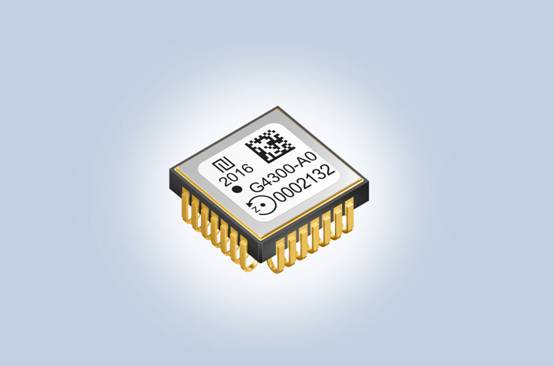TDK Launches High Stability GYPRO 4300 Digital MEMS Gyro for Dynamic Applications
2023-04-03
TDK Co., Ltd. (Tokyo Stock Exchange Code: 6762) recently launched a digital MEMS (Micro Electro Mechanical System) gyroscope with high stability and excellent vibration resistance - Tronics GYPRO ® 4300。 This element is very suitable for dynamic applications, with an input range of ± 300 °/s, a support bandwidth of 200 Hz, and a delay of 1 ms. It adopts a closed-loop structure, ensuring high linear accuracy and stability even in dynamic environments.
GYPRO4300 is the first product prototype of the Tronics GYPRO4000 new high-performance digital MEMS gyroscope platform, and the MEMS gyroscope platform is a useful complement to the recently released AXO300 closed-loop digital accelerometer platform.
Accurate navigation and positioning in dynamic applications
As a high-performance MEMS gyroscope with micro, digital, and low SWaP (size, weight, and power consumption), the GYPRO4300 has a typical bias stability of 0.5 °/h (up to 2 °/h) and an ARW (gyro angle random walk) of 0.1 °/√ h. This lays the foundation for achieving a new generation of precise positioning, navigation, and stability functions in various dynamic applications, such as railways, land vehicles, VTOL (vertical takeoff and landing) aircraft, and UAVs (unmanned aerial vehicles) Marine and subsea systems, as well as drilling and measuring instruments.
Micro and robust gyroscope for systems under strong vibration conditions
The Tronics GYPRO4300 gyroscope is designed with a closed loop structure and has a performance of up to 0.5 °/h/g ² Excellent vibration resistance, suitable for harsh working conditions. The gyroscope is packaged in a micro sealed J lead ceramic package, ensuring a long operating and storage life, meeting the stringent thermal cycling requirements of critical applications. In addition, the gyroscope is embedded with a fully hardcoded electronic device with a 24-bit digital SPI interface, which can be quickly integrated into INS (Inertial Navigation System), IMU (Inertial Measurement Unit), and AHRS (Attitude and Heading Reference System). To minimize mechanical cross coupling in multi axis applications, the GYPRO4300 also provides three frequency ranges.
Gyroscope with low SWaP, high cost performance, and high reliability
With its micro packaging and low power consumption, the Tronics GYPRO4300 gyroscope provides a digital, low-cost, and low SWaP alternative, making it ideal for replacing other cumbersome, expensive, and power consuming solutions, such as DTG (dynamically tuned gyroscope) and FOG (fiber optic gyroscope). The solid-state structure of the GYPRO4300 also reduces the number of internal components and reduces system complexity, with an MTBF (Mean Time Between Failures) of over 1000000 hours, which is 10 times more than the existing equivalent performance DTGs and FOGs. In addition, its built-in self-test function not only initially verifies the integrity of the sensor, but also enables continuous operational functional testing.
The GYPRO4300 gyroscope is a high performance Tronics AXO ® A useful addition to the 300 digital accelerometer, both share a SMD J lead ceramic package (12 x 12 x 5 mm) and are equipped with the same digital interface, enabling low-cost integration and assembly to a printed circuit board (PCB) and ensuring high reliability, even under harsh conditions with sudden temperature changes.
If necessary, you can directly contact Tronics or a specialized authorized agent (starting from TEXIM in Europe) to request a GYPRO4300 sample and evaluation reference. You can also use the Arduino based evaluation kit to quickly evaluate sensors. The suite provides multiple built-in test functions, such as output reading and recording, recalibration, and digital self-test.
The GYPRO4000 gyroscope platform will soon introduce more new product prototypes to meet various specific application requirements, such as improved bias stability, lower ARW, and less in band noise required for precise attitude determination.
Features and Applications
Main Applications
• INS (Inertial Navigation System) for GNSS assisted positioning and navigation of ground vehicles and trains
• AHRS (Attitude and Heading Reference System) for UAVs and e-VTOL
• MRU (Motion Reference Unit) for dynamic positioning of ships
• IMU (Inertial Measurement Unit) for precision robots and remotely operated vehicles
• Stabilization system
• Test instruments
Key Features and Advantages
• Measurement range ± 300 °/s, single axis gyroscope
• Zero bias stability: 0.5 °/h (typical), 2 °/h (maximum)
• Gyro angle random walk: 0.10 °/√ h
• Anti vibration performance: 0.5 °/h/g ²
• Delay: ≤ 1 ms
• Mean time between failures (MTBF):>1000000 hours
• 24-bit digital SPI interface
About TDK
TDK Corporation, headquartered in Tokyo, Japan, is a leading global electronics company that provides electronic solutions for intelligent societies. TDK is established on the basis of being proficient in material science, always at the forefront of technological development, and welcomes social change with "technology, attracting the future". The company was founded in 1935, specializing in ferrite, a key material used in electronic and magnetic products. TDK's comprehensive and innovative driven product portfolio includes passive components such as ceramic capacitors, aluminum electrolytic capacitors, thin film capacitors, magnetic products, high-frequency components, piezoelectric and protective devices, as well as sensors and sensor systems such as temperature and pressure, magnetic, and MEMS sensors. In addition, TDK also provides power and energy devices, magnetic heads, and other products. Product brands include TDK, EPCOS, InvenSense, Micronas, Tronics, and TDK-Lambda. TDK focuses on market segments such as automotive, industrial and consumer electronics, and information and communication technology. The company has a network of design, manufacturing, and sales offices in Asia, Europe, North America, and South America. In fiscal year 2022, TDK's total sales were $15.6 billion, with approximately 117000 employees worldwide.

